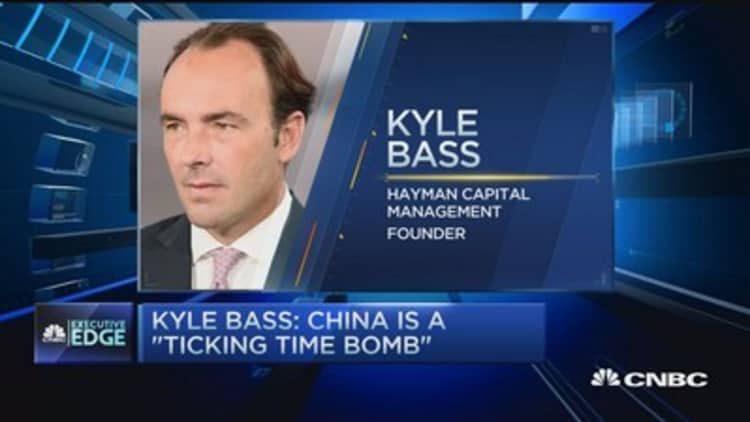While markets are flirting with the idea that a big devaluation of the yuan could take China's economic slowdown to a new and more dangerous place, economists and some money managers say it's not at all likely.
Over the past eight months, China's central bank has spent billions of dollars to fend off speculators who think the yuan will fall as China looks to pump up exports. The currency fell to a five-year low of 6.51 against the dollar on Jan. 6 as weak economic data spooked investors.
That's one reason uber-bear fund manager Kyle Bass, founder of Hayman Capital Management, could shake markets with a prediction that China's currency could lose 40 percent of its value in the next 18 months, thanks to the heavy debt load of state-backed Chinese enterprises.
Bass' idea is that China's banks are facing huge yet-undisclosed credit losses, largely on loans to manufacturers that, like the banks, are controlled by the government, and that the currency will fall as the government prints yuan to recapitalize the banks.
Bass' opinion remains, for now at least, a minority view. Other fund managers and economists argue that devaluation would do little to promote sales of Chinese exports that are already competitive, especially in the U.S., and that a sharp devaluation would backfire if countries like Australia, Malaysia and Indonesia were prodded to devalue their currencies in a bid to make sure they remain competitive with China.
Most of all, they said, a market-jolting move lower for the yuan would be at odds with a record of incrementalism that Beijing's government has nurtured for years, and it would rock investors who have already pushed the Shanghai Composite Index down 43 percent to 2,927 since its peak last June.
"They want a stable but gradually declining exchange rate if they can engineer it,'' said Barry Eichengreen, an economist at the University of California-Berkeley and former senior policy advisor for the International Monetary Fund. "Stability is good for their image in the markets, and a gradual decline is good for their effort to maintain a growth rate of 6 percent."
In a Feb. 10 letter to his investors, Bass called China's banking system a "ticking time bomb," saying banking losses in China could be five times what U.S. banks lost in the 2008 mortgage crisis, triggering a large devaluation to recapitalize China's banks. He calculated that Chinese banks, which have assets of $34 trillion, could lose more than $3 trillion of equity if loan losses reached 10 percent of assets. Last year, China's top banks reported that about 1.6 percent of loans were delinquent.
But analyses by bond-rating agencies have found little evidence of that, pointing to improving conditions in China's property market and relatively low losses to date on loans to manufacturing companies.
Beijing is more likely to enact gradual capital controls than it is to devalue the yuan, and it has dozens of tools it can use to accomplish its goal, Eichengreen said. Capital controls can even let Beijing accomplish a modest drop in the yuan's value without starting more capital flight, he argues. Among the most prominent: limiting Chinese families' ability to export money by buying insurance products from Hong Kong, or limiting sales of yuan for foreign currency.
Capital controls might upset the market, but not as much as a sharp devaluation would, and it would give China time to make reforms, Eichengreen said, adding, "It's a continuum. Capital can move less freely, or not at all.''
Indeed, devaluation is a less-than-great option, because so much of China's trade is with partners who use dollars or whose currency is pegged to the dollar. Because of the dollar's strength, Chinese goods are already cheap in these countries — and devaluation would not make them much more competitive, said Robert Tipp, chief investment strategist and head of global bonds for Prudential Fixed Income.
China's exports to the U.S. are only about 17 percent of its total, but exports to Hong Kong, which pegs its currency to the dollar, are another 16 percent. The dollar's strength means Chinese products are relatively cheap in the U.S., boosting sales, said Tipp. But the yuan has been rising against the euro in the last year, making China's exports relatively expensive in Europe, which accounts for about 16 percent of exports, according to international statistics portal Statista.
China's total exports are holding steady. In December, exports were higher than in November and down 1.5 percent from December 2014, even though each dollar commands about 5 percent more yuan than before the government effectively devalued the yuan in August. This was done by widening the allowable range of its daily moves against a basket of international currencies, which partly addressed the yuan's unwelcome strength against the euro.
"It's not a problem where they need a cheaper currency to be competitive,'' Tipp said.
Existing swings in the dollar and other currencies may be one reason to think investors' view of China's situation is not as dire as Bass contends, Moody's Analytics chief economist Mark Zandi said.
As much as 20 percent of the $763 billion reduction in foreign currency reserves since April 2015 may actually reflect the increase in the value of the dollar against the euro and other currencies, and have little to do with China itself, Zandi said.

"Chinese reserves are in dollars, euro, yen, sterling," Zandi said. "So if the dollar appreciates, then the value of the reserves in these other currencies declines. The dollar is up roughly 10 percent to 15 percent over the past 18 to 24 months against these currencies through the end of last year. So Chinese non-dollar reserves have fallen in dollar terms. There has been a substantial decline in Chinese reserves, but the decline is overstated by the strength of the dollar."
That idea may bolster what IHS Global Insight economist Sara Johnson calls the entrenched caution of Beijing's leadership, which she said would be unlikely to risk setting off competitive devaluations by other Asian nations.
"China's leadership is very risk-averse, and devaluation is a risky move," Johnson said.
China could find its hand forced on devaluation if exports were to drop more sharply or if strapped companies need cheaper currency in order to keep up payments to banks that are mostly state-backed.
Tipp argues that Beijing has successfully managed a complex growth surge for decades, but Eichengreen notes that a nervous world watching closely may make the job tougher than ever.
"It's going to be hard,'' he said. "Markets are on edge."
— By Tim Mullaney, special to CNBC.com






